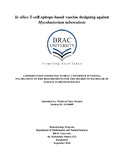In silico T-cell epitopebased vaccine designing against Mycobacterium tuberculosis

View/
Date
2018-09Publisher
BRAC UniversityAuthor
Mondol, Winifred ClaireMetadata
Show full item recordAbstract
Mycobacterium tuberculosis is an obligate pathogenic bacterial species in the family
Mycobacteriaceae and the causative agent of tuberculosis. At present BCG, an attenuated strain
of Mycobacterium bovis is used as a vaccine against tuberculosis. However, the overall success
of BCG is arguable as it has some serious limitations. Some of these include BCG’s inability to
protect against TB in adults and also in immunosuppressed patients. Thus, it is necessary to
develop vaccines that can replace BCG. In this study, various computational methods were
employed to identify T-cell epitopes from the ESX-2 secretion-associated protein EspG2, which
has the potential for vaccine development against Mycobacterium tuberculosis. After analyzing
the immune parameters of ESX-2 secretion-associated protein EspG2 using various databases
and bioinformatics tools which included IEBD, PEP-FOLD, PyRx, PyMol, etc. One T cell
epitope was identified which may be used as epitope-based peptide vaccine. Five highly
conserved, non- allergenic, non-cytotoxic putative T-cell epitopes were analyzed for their
binding with the HLA-C 12*03 molecule. Amongst them one epitope was chosen which
interacted with the maximum number of MHC alleles with satisfactory world population
coverage. Docking simulation assay further revealed that SGQRRYQVL has significantly lower
binding energy, which verifies that the binding cleft epitope interaction to HLA molecule will
occur when it will be applied in vivo. Additional in vivo investigation can further provide
concrete evidence that SGQRRYQVL be used as a peptide vaccine to effectively promote
immunity against TB.
